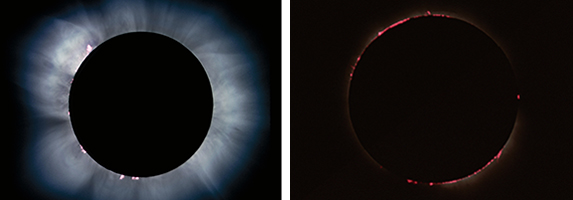
Photos from Glenn Schneider's umbraphile website from the 2001 and 2012 eclipses.
Six Press Releases About Astronomy-Related Work (and Play) at Steward
Here are news and press releases about four Steward people/groups.
Most recently Assistant Professor Elisabeth Krause is one of two UA faculty awarded a Sloan Research Fellowship this year. You can read about the two fellows and their research at this link.
Also this week, Sagan Fellow Kevin Wagner and collaborators, including Associate Professor Daniel Apai, have developed a new technique for mid-IR imaging of low-mass exoplanets. See the press release HERE.
Third, UArizona Astronomer Glenn Schneider, a total-solar-eclipse maven, was written up in "UA at Work". Glenn is one of the foremost eclipse chasers in the world. You can read the article HERE and you can see his large collection of photos and eclipse descriptions HERE.
Fourth, University Distinguished Professor Chris Impey of UArizona Astronomy has won the 2021 AAS Education Prize. Chris was cited for "his national and international impact through his outstanding teaching of thousands of students at his home university and, via the web, worldwide," and for several other achievements. You can read the AAS writeup HERE.
Fifth, Steward Observatory postdoc Dr Carlos Vargas has won a NASA "Astrophysics Pioneer" mission. He and his collaborators will study the warm-hot phase of the circumgalactic medium of galaxies. THIS LINK describes the proposed research and satellite.
Sixth, Regents' Professor Xiaohui Fan's quasar group, led in this particular research by Hubble Fellow Dr Feige Wang, has found the highest-redshift quasar to date, at z=7.64 (light travel time of more than 13 billion years). The light arriving tonight left this quasar when the Universe was only 670 million years old. The press release is HERE.

For Public
Public events include our Monday Night Lecture Series, world-reknowned Astronomy Camp and Mt Lemmon Sky Center.

For Students
A good place to start if you want to become an undergrad major or grad student, or need to find our schedule of classes.

For Scientists
Find telescopes and instruments, telescope time applications, staff and mountain contacts, and faculty and staff scientific interests.




